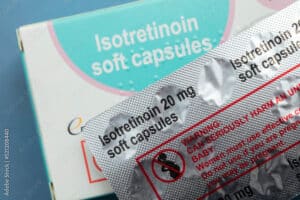Considering Accutane (Isotretinoin) FAQ
- Posted on: Feb 12 2024

Accutane also known as isotretinoin is a synthetic retinoid, derived from vitamin A a class of chemical found naturally in the body. They were discovered in the 1950’s
2. How does Accutane work to get rid of acne? Accutane is thought to benefit acne through multiple pathywys. It causes sebaceous gland to shrink. It suppresses sebum production. It also reduces comedone formation and the stickiness of cells in the follcile. It also decreases the popoulation of acne bacteria.
4. Who is a good candidate for Accutane? What type of acne is a good candidate for Accutane?
Accutane is FDA approved and indicated for nodular cystic acne. We typically define nodules as larger than a 1 cm Acne cysts are typically 5-6 mm in size. Patients have typically tried oral antibiotics and other therapies before moving on to Accutane. Recalcitrance to oral antibiotics or rapid relapse after stopping antibiotics may prompt some dermatologist to start accutane. The presence of acne scarring may also be a factor
5. Can you speak to the drying effects of Accutane? Why is Accutane drying? Accutane is drying because it destroys the sebaceous glands that normally provide oil and moisture to the face. it also causes the skin to turnover faster. When this happens, the outer layers of the skin cant do their job and retain water content.
6. Can you speak to how the drying effects of Accutane can show up on the skin, body, scalp, lips, hair etc.? Please discuss what this dryness looks like on each area (example: dry, flaky scalp; peeling lips; etc.)
Accutane related dryness looks different on parts of the body. The most classic presentation is lips with thick dry peeling skin. The skin on the lip is shedding so quickly that thick chunky flakes come off. If you pick them off the skin underneath appears bright red and can get infected so dermatologist advise not to pick the dead skin off. . The rest of the face and scalp can have dry fine flakes. The back of the hands can develop slightly pink scaly patches.
8. Any other side effects to being on Accutane? Accutane can affect almost every organ in the body. Here are some more comon ones. The most serious side effects are birth defects so avoidance of pregnancy is mandatory. Peeling lips and dry skin is common. Joint and muscle pains have been reported as well as tendonitis . Accutane can affect the liver and raise your blood lipids, (cholesterol and triglycerides) so periodic bloodwork may be required.
A less common side effect is headaches. Any headache lasting more than a day should be reported to your dermatologist. Accutane as well as antibiotics for acne has been associated with a rare condition, pseudotumor cerebri which is increased pressure in the brain. An ophthalmologist can diagnose by looking at the back of your eye. They look for a condition called papilledema which is an emergency. If untreated, it can lead to loss of vision, blindness and brain herniation.Depression and inflammaotry bowel diseasae have been attributed to Accutane in some cases.9. Are there any restrictions on skincare product use while on Accutane (for instance, do not use harsh acids/retinol/products with fragrance)? Patients on Accutane are usually told to discontinue their topical acne prescriptions which are usually drying. There is absolutely no need for a topical retinoid, i.e. Tretinoin, Adapalene Tazoratene since an oral retinoid will supercede this. Benzyol peroxide can be extremely irritating while taking retinoids
From the drug store or Sephora, glycolic, salicylic and lactic are no-no’s. Vitamin C creams and serums should also be stopped. It goes without saying that Scrubs, exfoliants, dermaplaning, home peels should not be used.10. When on Accutane, what skincare ingredients do you recommend seeking out in products? Why do you recommend these ingredients?
There are products you can use. Dermatologist think of bland moistuirzers. Barrier building ceramides which restore your skin barrier. Additionally, they are usually fragrance free. Sente also makes some good barrier repair cream. I recommend these creams because Accutane disrupts the skin barrier while taking it and for several months after.11. Can you recommend 3-4 skincare products you recommend for Accutane users? Discuss why you recommend it, any ingredient callouts, how to apply it, etc. (
Cetaphil moisturizing Lotion is a good first step and i often give out moisturizers. If your body feels dry. Cerave moisturizing cream can be helpful. For the lips , we commonly recommend Aquaphor or even plain Vaseline. Cetaphil healling ointment can be helpful12. Anything else you’d like to add? Drinking on Accutane. The vast majority of patient are young and often in college where drinking is widespread. Accutane can uncommonly affect the liver which is why blood tests are often performed. Expert consensus
Posted in: Uncategorized

 Same-day Appt
Same-day Appt 212.962.1115
212.962.1115 